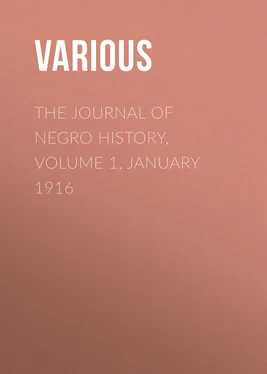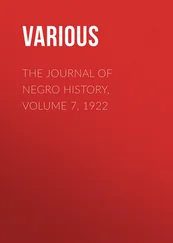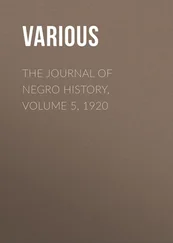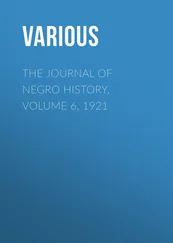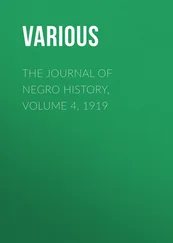Various - The Journal of Negro History, Volume 1, January 1916
Здесь есть возможность читать онлайн «Various - The Journal of Negro History, Volume 1, January 1916» — ознакомительный отрывок электронной книги совершенно бесплатно, а после прочтения отрывка купить полную версию. В некоторых случаях можно слушать аудио, скачать через торрент в формате fb2 и присутствует краткое содержание. Жанр: foreign_antique, periodic, История, foreign_edu, на английском языке. Описание произведения, (предисловие) а так же отзывы посетителей доступны на портале библиотеки ЛибКат.
- Название:The Journal of Negro History, Volume 1, January 1916
- Автор:
- Жанр:
- Год:неизвестен
- ISBN:нет данных
- Рейтинг книги:5 / 5. Голосов: 1
-
Избранное:Добавить в избранное
- Отзывы:
-
Ваша оценка:
- 100
- 1
- 2
- 3
- 4
- 5
The Journal of Negro History, Volume 1, January 1916: краткое содержание, описание и аннотация
Предлагаем к чтению аннотацию, описание, краткое содержание или предисловие (зависит от того, что написал сам автор книги «The Journal of Negro History, Volume 1, January 1916»). Если вы не нашли необходимую информацию о книге — напишите в комментариях, мы постараемся отыскать её.
The Journal of Negro History, Volume 1, January 1916 — читать онлайн ознакомительный отрывок
Ниже представлен текст книги, разбитый по страницам. Система сохранения места последней прочитанной страницы, позволяет с удобством читать онлайн бесплатно книгу «The Journal of Negro History, Volume 1, January 1916», без необходимости каждый раз заново искать на чём Вы остановились. Поставьте закладку, и сможете в любой момент перейти на страницу, на которой закончили чтение.
Интервал:
Закладка:
67
The following enactments of the Virginia General Assembly will give a better idea of the extent of this humiliation:
4. Be it further enacted that all meetings of free Negroes or mulattoes at any school house, church, meeting-house or other place for teaching them reading or writing, either in the day or night, under whatsoever pretext, shall be deemed and considered as an unlawful assembly; and any justice of the county or corporation, wherein such assemblage shall be, either from his own knowledge, or on the information of others, of such unlawful assemblage or meeting, shall issue his warrant directed to any sworn officer or officers, authorizing him or them to enter the house or houses where such unlawful assemblage or meeting may be, for the purpose of apprehending or dispersing such free Negroes or mulattoes and to inflict corporal punishment on the offender or offenders at the discretion of any justice of the peace, not exceeding 20 lashes.
5. Be it further enacted that if any white person or persons assemble with free Negroes or mulattoes, at any school house, church, meeting-house, or other place for the purpose of instructing such free Negroes or mulattoes to read or write, such person or persons shall, on conviction thereof, be fined in a sum not exceeding fifty dollars, and moreover may be imprisoned at the discretion not exceeding two months.
6. Be it further enacted that if any white persons for pay or compensation, shall assemble with any slaves for the purpose of teaching and shall teach any slave to read or write, such persons or any white person or persons contracting with such teacher so to act, who shall offend as aforesaid, shall for each offence, be fined at the discretion of a jury in a sum not less than ten nor exceeding one hundred dollars, to be recovered on an information or indictment. Acts of the General Assembly of Virginia, 1831, p. 107.
I. Be it enacted by the General Assembly of Virginia that no slave, free Negro or mulatto, whether he shall have been ordained or licensed or otherwise, shall hereafter undertake to preach, exhort or conduct or hold any assembly or meeting, for religious or other purposes, either in the day time or at night; and any slave, free Negro or mulatto so offending shall for every such offence be punished with stripes at the discretion of any justice of the peace, not exceeding 39 lashes; and any person desiring so to do, shall have authority without any previous written precept or otherwise, to apprehend any such offender and carry him before such justice.
II. Any slave, free Negro or mulatto who shall hereafter attend any preaching, meeting or other assembly, held or pretended to be held for religious purposes, or other instruction, conducted by any slave, free Negro or mulatto preacher, ordained or otherwise; any slave who shall hereafter attend any preaching in the night time although conducted by a white minister, without a written permission from his or her owner, overseer or master or agent of either of them, shall be punished by stripes at the discretion of any justice of the peace, not exceeding 39 lashes, and may for that purpose be apprehended by any person, without any written or other precept:
Provided , That nothing herein contained shall be so construed as to prevent the master or owner of slaves or any white person to whom any free Negro or mulatto is bound, or in whose employment, or on whose plantation or lot such free Negro or mulatto lives, from carrying or permitting any such slave, free Negro or mulatto, to go with him, her or them, or with any part of his, her, or their white family to any place of worship, conducted by a white minister in the night time: And provided also, That nothing in this or any former law, shall be construed as to prevent any ordained or licensed white minister of the gospel, or any layman licensed for that purpose by the denomination to which he may belong, from preaching or giving religious instruction to slaves, free Negroes and mulattoes in the day time; nor to deprive any masters or owners of slaves of the right to engage, or employ any free white person whom they think proper to give religious instruction to their slaves; nor to prevent the assembling of slaves of any one owner or master together at any time for religious devotion. Acts of the General Assembly of Virginia, 1831-1832, pp. 20-21.
68
Campbell, Political History of Michigan, 246.
69
Campbell, Political History of Michigan, 246.
70
Slavery did not immediately cease, however. The number of slaves in the vicinity of Detroit in 1773 were ninety-six; 127 in 1778; and 175 in 1783. Detroit had a colored population of 15 in 1805 and two years later a number had sufficiently increased for Governor Hull to organize a company of militia among them. The increase had been due to the coming of refugees from Canada. The Census of 1810 showed 17 slaves in Detroit; that of 1830 shows 32 in Michigan and an enumeration subsequent to 1836 shows that all were dead or manumitted. See Census of the United States.
71
Laws of Michigan, 1827.
72
This riot occurred on June 14, 1833. Thornton Blackburn and his wife, the alleged runaways from Kentucky, were lodged in jail pending the departure of a boat. A crowd of colored men and women, armed with clubs, stones and pistols, gathered in the vicinity of the jail. Upon the pretext of visiting Blackburn's wife a colored woman was admitted to the jail and by an exchange of clothing effected the escape of the prisoner who immediately crossed into Canada. Some time thereafter the sheriff attempted to take his other prisoner to the boat, but was knocked down and badly beaten. During the encounter the sheriff fired into the mob, but Blackburn was rescued and carried to Canada. This caused a great disturbance among the white people. They armed themselves and attacked the blacks wherever they could be found. The city council convened and undertook to dispose of the trouble by enforcing the law of 1827 requiring that colored people should stay off the streets at night. Utley, Byron and McCutcheon, "Michigan as a Province and State," II, 347.
73
Five years after the organization of the Detroit Anti-Slavery Society Henry Bibb, an ex-slave, came to the city and lectured for two years under the auspices of the Liberty Association, which was promoting the election of anti-slavery candidates. Public sentiment against slavery was becoming such that the Legislature of Michigan passed a law prohibiting the use of jails to detain fugitives. Frederick Douglass and John Brown found many friends of their cause in Detroit. Of the many organized efforts made to circumvent the law and assist fugitives one society purchased land and established homes for as many as 50 families between 1850 and 1872. Farmer, "History of Detroit and Michigan," I, Chapter XLVIII.
74
The immediate cause of the riot in Detroit was the arrest, conviction, and imprisonment of a colored man called William Faulkner charged with committing an assault on a little girl. Feeling that the prisoner was guilty, bands of ruffians swept through the streets and mercilessly beat colored people. Seven years later it was discovered that Faulkner was innocent and to reimburse him for his losses and humiliation the same ruffians raised a handsome sum to set him up in business. See Farmer's History of Detroit and Michigan, Chapter XLVIII.
75
A study of the directories of Detroit shows that a considerable number of Negroes had entered the higher pursuits of labor. See especially the Detroit Directory for 1865.
76
Simmons, "Men of Mark," 356.
Читать дальшеИнтервал:
Закладка:
Похожие книги на «The Journal of Negro History, Volume 1, January 1916»
Представляем Вашему вниманию похожие книги на «The Journal of Negro History, Volume 1, January 1916» списком для выбора. Мы отобрали схожую по названию и смыслу литературу в надежде предоставить читателям больше вариантов отыскать новые, интересные, ещё непрочитанные произведения.
Обсуждение, отзывы о книге «The Journal of Negro History, Volume 1, January 1916» и просто собственные мнения читателей. Оставьте ваши комментарии, напишите, что Вы думаете о произведении, его смысле или главных героях. Укажите что конкретно понравилось, а что нет, и почему Вы так считаете.
